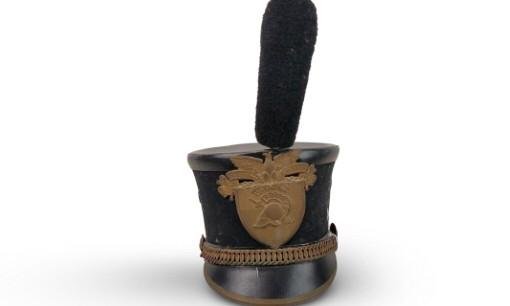Erik Hoyer’s collecting treasures
As a history buff, I’m always amazed to see old relics, notable documents, and other items that lived through uncertain times. It’s an honor to represent a consignor who served in our military, and we’re often tasked with selling their uniforms, medals, badges, flags, weapons and other memorabilia.

The majority of military collectibles that come through our auction house are from the United States, but we also see quite a bit of British, Canadian, German, Japanese, and other military collectibles. We sometimes get criticized for auctioning items from former enemies, but often the G.I.s brought these items home after winning the war.
Military helmets make for a pretty cool addition to any collection. Right now, there’s a surplus of them hitting the secondary market as World War II and other veterans downsize or pass away. It’s a good time to collect them, and a great way to own a piece of history.
Earlier this month, we sold a U.S. West Point Military Academy Shako helmet circa 1900 for $55. Considering it was over 100 years old, it was in pretty good shape and I’d say that was a good deal for the bidder.
Of course, wars have been taking place for centuries, and bidders will pay top dollar for rare military helmets. In 2010, an anonymous bidder paid more than $3 million for the Crosby Garrett Helmet, which was sold at Christie’s South Kensington auction house. It was one of only three Roman cavalry parade helmets that had been discovered in Britain complete with face-masks. Experts believed it dated back to the late 1st to 2nd Century A.D.
Ancient Japanese Samurai helmets also do well at auction. In 2013, a Conch-shaped Kawari Kabuto realized $377,000 at Bonhams New York. An important symbol in the Samurai culture, the conch shell was used in the call for prayer but also to summon troops. It was estimated that this odd shaped helmet dated back to the Edo period, between 1603 and 1868.
Soldiers today have better protection with the development of Kevlar and advanced industrial designs. Known as a synthetic fiber that is “five times stronger than steel on an equal weight basis,” Kevlar helps to protect against bullets, shrapnel, shell fragments and other ballistic projectiles. Today’s military helmets also include space for sunglasses, goggles, a clip for night-vision goggles and other accessories to protect soldiers.
That’s another reason why collecting older military helmets makes sense right now. As protective head gear continues to evolve, these helmets are becoming obsolete.
But, savvy collectors know that some items are cyclical, and I would not be surprised if we see the value of some of these older helmets increase in the near future. However, don’t limit yourself to helmets as other militaria can be very sought out and highly collectible